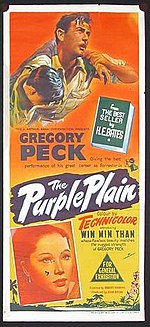The Purple Plain
| The Purple Plain | |
|---|---|

Theatrical poster
|
|
| Directed by | Robert Parrish |
| Produced by | John Bryan |
| Screenplay by | Eric Ambler |
| Based on |
The Purple Plain by H. E. Bates |
| Starring |
Gregory Peck Win Min Than Maurice Denham Lyndon Brook Bernard Lee |
| Music by | John Veale |
| Cinematography | Geoffrey Unsworth |
| Edited by | Clive Donner |
|
Production
company |
|
| Distributed by |
General Film Distributors (UK) United Artists (US) |
|
Release date
|
|
|
Running time
|
100 minutes |
| Country | United Kingdom United States |
| Language | English |
| Box office | $1.3 million (US) |
The Purple Plain, also known as Llanura Roja, is a 1954 British war film, directed by Robert Parrish, with Gregory Peck playing a Royal Canadian Air Force pilot serving in the Royal Air Force in the Burma Campaign in the closing months of the World War II, who is battling with depression after having lost his wife. It was nominated for two BAFTA awards.
Bill Forrester (Gregory Peck), a RCAF pilot serving in the Royal Air Force in Burma, flying de Havilland Mosquitos, a two-seat fighter-bomber. Forrester is emotionally distraught after losing his new wife in the ‘’Blitz’’ in London and has become self destructive, seeking to end his life in action. "You'd think that would be easy in a war", he explains to a Burmese woman, Anna, "but I just kept getting medals instead." With Anna's support, Bill begins to recover his emotional stability.
Forrester and his new navigator, Carrington (Lyndon Brook), on a routine non-combat flight to Myitkyina, with Flight Lieutenant Blore (Maurice Denham) as passenger in the Mosquito's bomb bay, because of an engine fire, is forced to go down in a remote desert area of Burma's central plain controlled by the Japanese. As the three men struggle to survive in the hostile environment, the self-destructive Bill finally realises that he can depend on support from others and that he may have someone to live for. Blore, however, abandons them to attempt to return to the crash site and commits suicide.
The Purple Plain is regarded generally as historically accurate with good production values and attention to detail, and depicts the native Burmese in a respectful manner. The film is based on the 1947 novel The Purple Plain by H. E. Bates, one of three novels he wrote after his travels to Burma and India in 1945, on military assignment to write short pieces portraying the Burmese war for American readers. The novel was first serialised in the Saturday Evening Post in September and October 1947. The film script was written by novelist Eric Ambler in consultation with Bates.
...
Wikipedia
